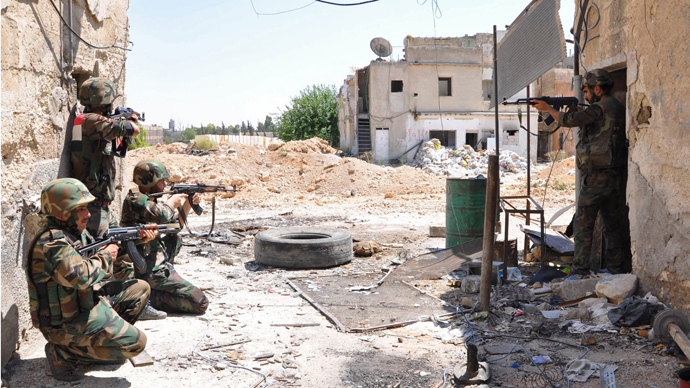It is a proxy-war in Syria and has been for a long time

Israel, Turkey and NATO support rebels and foreigners from more than 25 countries fighting for Syria’s disintegration and the establishment of an Islamist Caliphate instead, journalist Manuel Ochsenreiter, who's extensively covered the conflict, told RT.
RT:We are seeing such a sharp change of rhetoric from Turkey after accusations the flotilla attack back in 2010 was a massacre. How did it all change so quickly, because only four months ago Ankara was still pressing with its court case over the incident?
Manuel Ochsenreiter: Well we have first to see that Turkey plays a very very important role in the Syrian conflict. We know that at the Turkish-Syrian border there are several camps where international terrorists can come and where they are trained for their activities on Syrian soil. So Turkey is playing an important role and of course Turkey is also an ally of Israel despite the criticism of Prime Minister Erdogan in the past years. Turkey is still a very important ally and maybe the most important ally of Israel in the region.
RT:What's more Important for Turkey, getting rid of Assad or keeping on good terms with the rest of the regional players?
Manuel Ochsenreiter: I think that Turkey is not just acting on their own behalf. Turkey, we have to remember is very very important NATO member and Turkey knows that it’s acting also for NATO. Turkey is right now providing the military bases for the NATO “Patriot” rocket system which is directed against Syria. So Turkey knows how to connect its own let me call it “New Ataman Dream” of being the leading power of the region, with its role playing at NATO. And NATO is acting very aggressively towards Syria, especially the US but also the UK and France.
RT:What does such cooperation between some of the Syrian government's supposedly toughest rivals in the region mean for the Assad regime?
Manuel Ochsenreiter: I don’t think this is a huge change from the general situation because Israel was supporting in the past the so-called “rebels” in this what the media claim is “a civil war”. What is it in reality - for a long time – a proxy-war. We have right now militants from more than 25 countries fighting in Syria against the Syrian government. And of course Israel was supporting the rebels. They found arms and weaponry from Israel on the rebel side. And Turkey also is supporting in a strong way the rebels on Syrian soil. We know that Turkey was even stealing from industrial compounds and transporting them to Turkey. So both these countries play already since a long time an important role in that conflict, in that a proxy-war on Syrian soil is not surprising at all.
RT:What started off as an internal conflict is now drawing in multiple external player - Iran sent in revolutionary guards, Lebanon's Hezbollah is in the field, the west is mulling arms supplies to the rebels Al-Qaeda is there fighting against the opposition. Where is this going?
Manuel Ochsenreiter: It’s hard to say when it will end. The only thing what is sure is that this war will end at that moment when the west and Arabic countries will stop any support of the rebels, when they push the rebels to negotiate, the Syrian rebels at least, because foreign militants don’t have any reason to negotiate with the Syrian regime. They want something else, they want to disintegrate Syria, they want to establish in several regions maybe a type of Islamist Caliphate. When we look at Western politicians what they say about Syria they dream already about the disintegration of Syria and several sectarian entities. So what this means, this conflict will end at the point when at least the Syrian opposition, the armed opposition, comes together with government to negotiate but this will not take place until the moment when the foreign support stops for those militants.
RT:When you talk about when the foreign support stops for example Afghanistan just told last week or so that Al-Qaeda militants were negotiating with rebel commanders transit roots for incoming weapon imports. Then we understand that the Al-Qaeda leader killed the rebel commander and the Al-Qaeda commander said: “All rebel commanders must be killed”. Now do you think the West is to seriously consider arming the rebels if indeed Al-Qaeda has infiltrated the ranks?
Manuel Ochsenreiter: We should really see the realities. In the West they always claim there are the “good rebels” which are the so-called moderate rebels and the so-called “bad rebels” which are the Islamists, the Al-Qaeda linked Al-Nursa Front rebels. But this doesn’t fit the reality at all. Reality is that in certain battlegrounds they cooperate very closely, that there is a fluent circulation of men and of fighters and for example what I heard yesterday from a reliable security source in Damascus is that between one hundred or two hundred rockets were delivered to so-called “moderate rebels” which is the FSA, but they sold them to the El-Nursa front because they have a lot of money, the get from the Gulf States for example. Seriously it’s very very hard to distinguish between “moderates” and extremists. Just let me finish this with one sentence: “The rebel, we all witness eating a heart of a killed Syrian soldier was not an extremist, we’re speaking, we are speaking here about so-called “moderate rebel”, he was FSA man, not an El-Nursa Front man”.
The statements, views and opinions expressed in this column are solely those of the author and do not necessarily represent those of RT.













